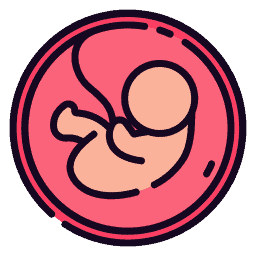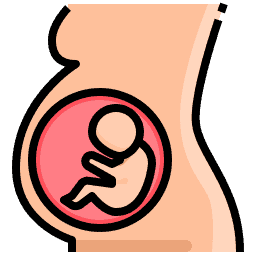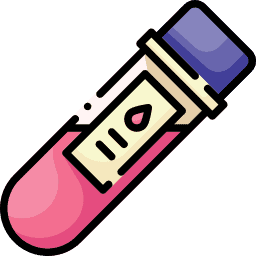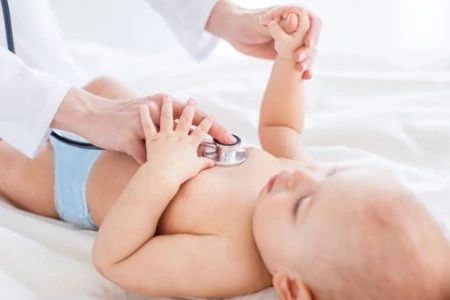If you’re planning a pregnancy or you’re in the early stages of one, there’s no better time to learn about birth defects.
Birth defects are critical and costly conditions that affect more than 150,000 children each year.
Read more about what birth defects are, what causes them, and what you should know about prevention.
Understanding Birth Defects

When a structural abnormality or malformation occurs during pregnancy or at birth, that is what’s called a birth defect. They can range from mild conditions to ones that can prove to be life-threatening.
Why birth defects happen is often a mystery — over 50 percent of birth defects happen for an unknown reason (1). Some, however, are easier to trace and can be caused by genetics, older age, certain medical conditions, medicines, and drugs.
Education Is Key
Far more suffer from birth defects than that though. For every 33 babies born, one will have a birth defect (2). That amounts to a staggering 150,000 children each year who will be born facing the challenge of birth defects.
Major birth defects that reveal themselves at birth are fairly rare, at about 3 percent of births in the U.S. Many other birth defects are discovered as time passes — they aren’t always apparent at birth.

Although it’s definitely not as much of a concern as the health and well-being of children, birth defects also end up costing parents a lot of money. Each year, more than $1.4 billion is spent on medical care for children because of their birth defects.
What makes birth defects even more heartbreaking is the fact that some of them are preventable just from what we already know about them. If all pregnant women were to get proper prenatal care, a quarter of infant deaths could be avoided.
Every year, up to 1.3 million pregnant women get inadequate prenatal care. Pregnant women with uncomplicated pregnancies should visit their obstetrician anywhere from 10 to 15 times for prenatal visits (3).
You should call for that first appointment as soon as you realize you are pregnant, even though the doctor may still wait until closer to your 12th week of pregnancy before seeing you if everything seems to be going well and you have no underlying health issues.
Women avoid those crucial prenatal care visits for a variety of reasons, including the prohibitive cost of medical appointments, the inability to take days off of work, and sometimes even the lack of seeing the importance or need for those appointments.
If you know there is a chance that you may become or are currently pregnant begin taking your prenatal vitamins as soon as you can as most organ development occurs at the beginning of pregnancy.
Editor's Note:
Dr. Njoud Jweihan, MDRisk Factors for Birth Defects

Although there are many different types of birth defects, some are rare, while others are way more prevalent. Here are some of the most common ones you should be aware of — knowing what they are and what can be done about them should make you feel more empowered.
1. Alcohol
Alcohol is never a good idea during pregnancy because it can cause so many problems for your developing fetus. Any alcohol that you drink goes right to your baby from the umbilical cord.
A Slippery Slope
In addition to that, there is no way of knowing how much alcohol will lead to a birth defect. It’s better to play it safe — nine months of you waiting for a drink is better than a lifetime of consequences for your child. If you feel like you have an addiction and need help it is never wrong to seek help from support groups. Make sure to speak to your doctor about helpful methods that can have better health outcomes for you and your baby.
2. Smoking
It’s a good idea to quit smoking before you attempt to get pregnant, but if you are already pregnant, it’s not too late. Smoking has been linked or suspected as a link to many birth defects such as preterm delivery, low birth weight, issues with the placenta and more, and at the very least, it’s not good for either you or your baby.
It’s going to be a struggle to quit, but there are so many rewards, it’s definitely worth the effort.
If you’re already pregnant, you may not want to use medications or nicotine patches that smokers who aren’t pregnant can utilize to help them quit.
Here are some methods you can use for quitting:
- Dropping cigarettes cold turkey: This is a really hard method to do, but if you’re worried about the safety of your baby, it might give you the motivation to do it.
- Cut back method: If you’re in the early weeks of pregnancy, you still have time to use this method. To ensure the best safety for your baby, you should try to be completely tobacco free by your 14th week of pregnancy (4).
- Counseling: Sometimes it helps just to feel like you’re not alone. Counseling sessions can help you kick those butts for good.
3. Drugs
Illegal drugs are a bad idea for multiple reasons while you’re pregnant. But one of the most compelling reasons to stay away from them is the harm those drugs can bring to your baby.
Birth defects can be caused by drug use, and drug use can result in an awful withdrawal process for your baby after birth as well. Drug use can cause physical birth defects for your baby as well as cognitive ones, such as learning issues (5).
Don’t Go Solo
A professional can help you find the best method for protecting your baby’s health, and can line you up with any other resources you need.
4. Certain Medications
Talk to a healthcare provider about any medications you are currently taking or thinking about taking.
This includes prescription and over-the-counter medications and dietary or herbal supplements.
Always consult your doctor first before stopping or starting any type of medication.
5. Infections
Pregnant women also have to keep an eye out for other infections, particularly those caused by viruses. Viruses that can cause birth defects and other issues for pregnant women, include rubella, enteroviruses, adenovirus, herpes, and cytomegalovirus (6).
To help protect yourself from infections, you should make sure you keep your hands washed well, especially after doing things that could increase your exposure to infections. Make sure you wash your hands with soap and water after:
- Going to the bathroom.
- Handling raw foods.
- Handling dirt.
- Touching pets, particularly hamsters and guinea pigs.
- Changing a diaper.
- Being around someone who is sick.
- Spending time with small children because they are often fighting some infection or another.
If you know that someone close to you has a virus that could be dangerous to you and your baby, avoid contact with this person and make sure to practice proper hygiene around them.
Editor's Note:
Dr. Njoud Jweihan, MD6. Zika Virus
The Zika virus gave expectant moms one more reason to panic in 2015 as it began spreading throughout the Western Hemisphere.
Women who contract the Zika virus when pregnant are more likely to give birth to a baby with microcephaly. Microcephaly is when a baby’s head is smaller than it should be.
Aside from a cosmetic standpoint, microcephaly poses a problem because the small head can mean smaller brains. It can also cause eye issues and problems with having a full range of motion for the joints (7). Preterm delivery and miscarriage can also result from contracting the Zika virus.
The Zika virus is spread primarily by mosquito bites and is more common in certain tropical regions. Taking steps to reduce your chances of being bitten by a mosquito in places the Zika virus has reached is a good precaution to take when you’re pregnant.
That might mean spending more time indoors and avoiding travel to regions where the mosquito was found to be in high prevalence. If you believe you have the Zika virus your health care provider can do a blood test to confirm this suspicion.
7. Steam Rooms, Saunas, and Hot Tubs
Heat and developing babies are not a great match. That’s why pregnant women should stay away from hot tubs, and other sources of heat like saunas and steam rooms.
Hot tubs, in particular, have been linked to a higher risk of certain birth defects, including neural tube birth defects (8).
Using a hot tub during early pregnancy seems to be particularly risky because it’s during the first 12 weeks when a child’s internal organs and body are being formed. In addition, at that time the baby has not developed a proper thermoregulatory system to adapt to warm and cold temperatures.
The longer a woman stays in a hot tub, the higher her body temperature will go. If you decide you can’t skip hot tub sessions, even for the health of your baby, you should at least limit the length of them, keeping them to preferably less than 10 minutes.
But the best policy is to avoid them altogether during pregnancy, just to be on the safe side.
Lowering the Risk of Birth Defects

While you can never eliminate your baby’s risk of birth defects entirely, there are steps you can take to prepare your body for your pregnancy and lessen your risk as much as you can.
1. Get Vaccinated
When you’re planning to start a family, you should first talk to your doctor about making sure your vaccines are up to date. The measles, mumps, and rubella vaccine should be administered at least one month before you begin trying to conceive.
When you find out you are pregnant, then you should add the Tdap vaccine, which is used to prevent whooping cough. This vaccine will give your baby some early protection against whooping cough — although it won’t last for long after their birth.
Eventually around 6 months of age, baby will develop their own antibodies or infection-fighting proteins and their immune system will be strong enough on its own.
Editor's Note:
Dr. Njoud Jweihan, MDIn addition to those two, you should also strongly consider adding the flu shot because the effects of the flu on pregnant women and their fetuses can be quite severe (9).
2. Supplement with Folic Acid
Making sure you’re getting enough folic acid during pregnancy is critical to giving your baby their best shot at health. Doctors say you should get at least 400 micrograms of folic acid daily to lessen the chance of brain and spinal cord birth defects.
That amount of folic acid should be in your prenatal vitamin. It should be in addition to any amount you get from your diet. Fortified cereal is a great source of folic acid.
If you’re planning on becoming pregnant, you should start taking folic acid before conception. You want to have a healthy supply in your system because many birth defects happen within the first month of pregnancy (10).
3. Maintain a Healthy Weight
Obesity is an epidemic in the U.S., as it is in other parts of the world. While obesity is a bad thing for the general population, it can also have disastrous consequences for pregnant women and their babies.
If a woman is obese before she conceives, her baby will be at a greater risk for having a congenital heart defect (11). Obesity can also cause gestational diabetes or diabetes that only happens during pregnancy, and high blood pressure which can have serious consequences for you and baby including increasing the risk of preeclampsia.
If you know you want to start a family soon and you’re carrying a few extra pounds or more, it’d be smart to work on losing them. There’s no magic bullet for losing weight — you’ll have to do it the old-fashioned way by counting calories and getting plenty of exercise.
Although obesity is dangerous during pregnancy, being extremely underweight is also harmful to you and your baby. Nutritional deficiencies can also lead to developmental problems that affect your baby’s growth in a negative way as well. Make sure to speak to your doctor about what weight goal you need to meet during your pregnancy.
4. Keep Diabetes Under Control
There are two types of diabetes during pregnancy. The type that is present before pregnancy and then there is gestational diabetes, which is the kind some women develop later in pregnancy.
Both types have to be managed, but gestational diabetes isn’t as risky as diabetes that is present before birth. When a woman’s blood sugar is higher than it should be during the early weeks of pregnancy, it increases the odds of birth defects and even miscarriages.
That’s why it’s so important to make sure your blood sugar levels are good before you attempt to get pregnant. If you’re having trouble maintaining control over your sugar levels, work with your doctor first to stabilize them before getting pregnant.
5. Avoid Certain Foods
Making nutritious choices during pregnancy is one of the keys to giving your baby a healthy start. But it’s equally important to know which foods you should stay away from too.
Certain foods can cause infections that can severely impact your baby, and they can also have a lot of toxins that can cause harm to a developing baby. Some types of infections can lead to birth defects so it’s important to avoid them if you can while you’re expecting (12).
Here is a list of foods you should stay away from during your pregnancy:
- Uncooked seafood.
- Shellfish.
- Smoked seafood.
- Rare-cooked meats.
- Deli meats.
- Raw eggs.
- Soft cheeses like brie.
- Unpasteurized milk or juice.
- Unwashed fruits and vegetables.
- Fish with high levels of mercury.
- Alcohol.
- Raw sprouts.
- Unwashed produce.
Tests for Birth Defects

Birth defect tests can give parents tremendous peace of mind when the results are negative. When they are positive and indicate there may be a potential problem, they can give parents time to deal with their emotions about it and come up with a plan of attack for how to best handle those defects.
While sometimes there isn’t much, if anything, doctors can do about the birth defects, other times they can help tremendously, such as in the case of spina bifida surgeries done pre-birth on the fetus.
First Trimester Screening Tests
- Nuchal translucency test: This ultrasound screening is often done in the late part of the first trimester. It measures the back of your baby’s neck — a thicker than normal measurement can be an early warning sign of particular birth defects, such as Down syndrome.
- Blood tests: The blood tests in the first trimester look specifically at two things — beta-human chorionic gonadotropin, better known as beta-hCG, and plasma protein A, better known as PAPP-A. Large amounts of beta-hCG may mean certain birth defects could be present, while low amounts of PAPP-A may be a red flag for birth defects.
- Cell-free fetal DNA: If there’s reason to believe a woman may have a baby with a genetic condition, like Down syndrome, this blood test can be performed in the first trimester.
Second Trimester Screening Tests:
- Triple or quadruple blood test: This test is done anywhere from the 15th to the 20th week of pregnancy to find out whether your baby might have certain issues. Alpha-fetoprotein (AFP), beta-human chorionic gonadotropin (beta-hCG), and a kind of estrogen are checked in the triple test. In the quad test, the hormone inhibin A level is checked as well (13).
- Ultrasound: This is the test called the anatomy scan many expectant moms look forward to but are still nervous about. Using an ultrasound between 18 to 20 weeks of pregnancy can help doctors spot problems, such as heart, belly, or spine issues, as well as Down syndrome (14).
First Trimester Diagnostic Tests
- Chorionic villus sampling: This test is performed at the 10-to-12-week point of your pregnancy. It can help identify conditions such as Down syndrome, sickle cell disease, and cystic fibrosis. To collect the chorionic villus cells, the doctor will put a catheter in your uterus or put a needle in your uterus through your belly (15).
Second Trimester Diagnostic Tests
- Amniocentesis: Performed between 15 to 20 weeks of your pregnancy, amniocentesis is when your doctor sticks a needle into your belly to reach the uterus to get a sample of amniotic fluid. This test can detect chromosomal-related problems and other defects like spina bifida.
These tests are only performed after consent from the patient has been obtained and if the patient meets the risk factors that would require further testing. Risk factors can include positive results from a basic prenatal test, having a child with a genetic condition, and being over the age of 35.
Editor's Note:
Dr. Njoud Jweihan, MDFAQs
Bottom Line

As with anything else, a successful pregnancy can really benefit from a good plan. Waiting until you are already pregnant might cause irreversible problems that a little forethought would have eliminated.
It’s normal to be worried about the possibility of birth defects as you move through the nine months you’re carrying your child. But by educating yourself about the odds of birth defects, realizing they all aren’t catastrophic life-changing events, and coming up with a timeline on when and how they might be identified, you’ll feel a little more like you’re in the driver’s seat.













